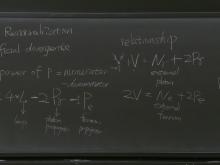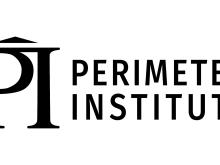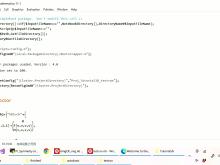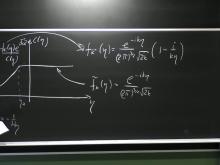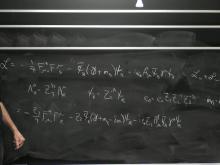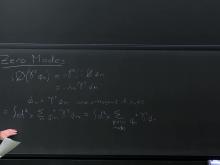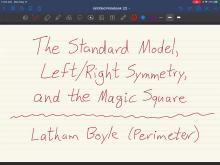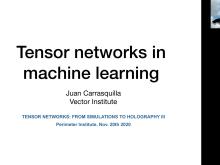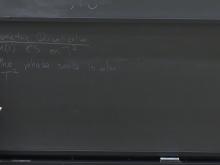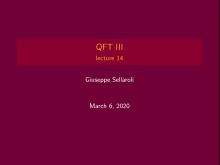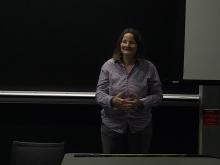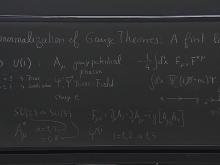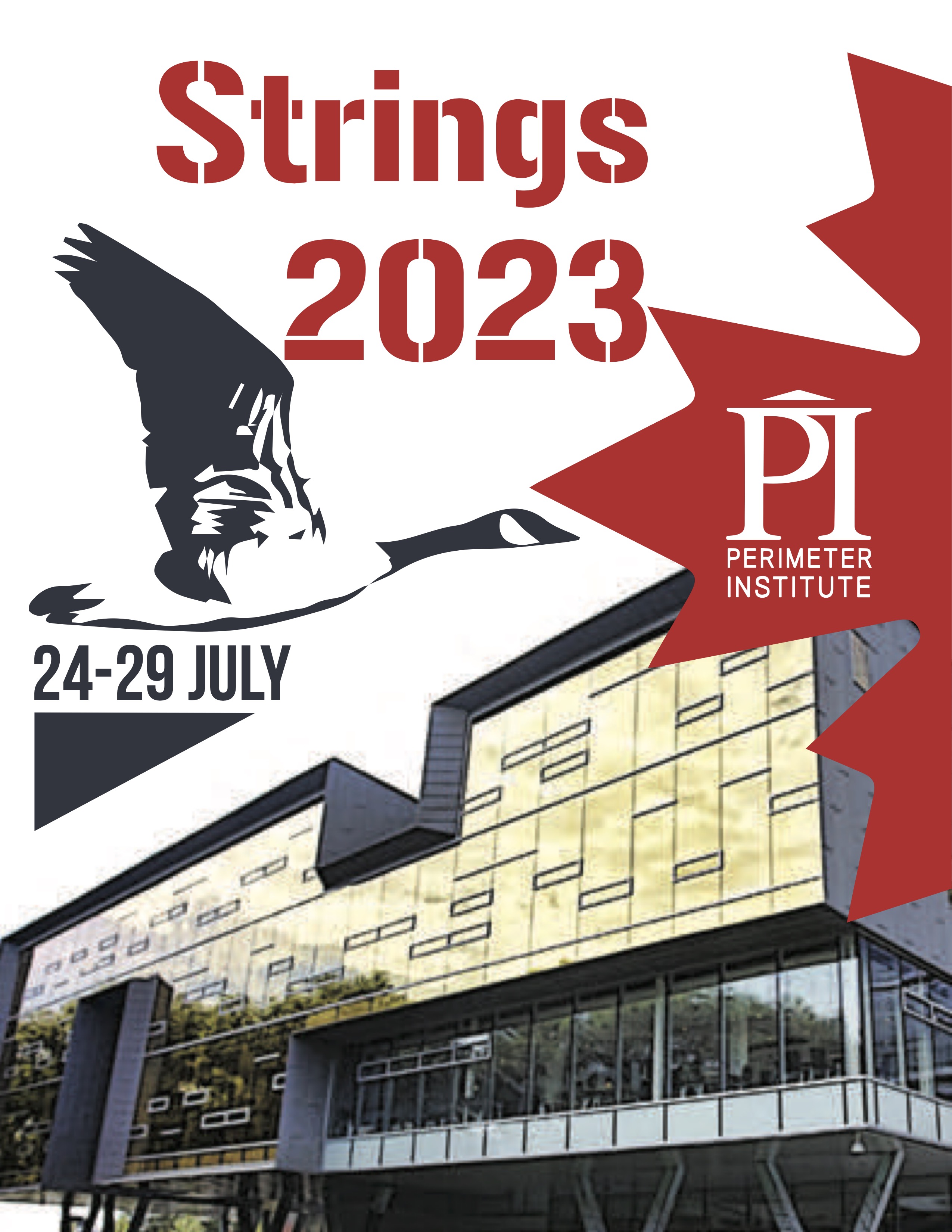Quantum field theory was originally developed as the extension of quantum mechanics needed to accommodate the principles of special relativity. Today quantum field theory is the modern paradigm with which we understand particle physics, condensed matter systems, and many aspects of early universe cosmology, and it is used to describe the interactions of elementary particles, the dynamics of many body systems and critical phenomena, all with exquisite accuracy. Currently, Perimeter researchers are producing world-leading advances in the study of integrability and scattering amplitudes in quantum field theories. String theory is a theoretical framework which was proposed to produce a unified description of all particles and forces in nature, including gravity. It is based on the idea that at very short distances, all particles should in fact be seen to be extended one-dimensional objects, i.e., ‘strings.’ Modern string theory has grown to be a broad and varied field of research with strong connections to quantum gravity, particle physics and cosmology, as well as mathematics. An exciting new framework known as ‘holography’ has emerged from string theory whereby quantum gravity is formulated in terms of quantum field theory in one less dimension. This symbiosis between quantum field theory and quantum gravity has been a focus of many Perimeter researchers. This has led to the development of exciting new methods to study the quantum dynamics of gauge theories and in the application of these techniques to new domains, such as nuclear physics and condensed matter physics
Format results
-
13 talks-Collection NumberC23044
Talk
-
Strings 2023
30 talks-Collection NumberC23001Talk
-

Opening Remarks
Robert Myers Perimeter Institute for Theoretical Physics
-

-

Research Talk 2 - Burns holography
Atul Sharma Harvard University
-

Research Talk 3 - Swampland and a Unification of the Dark Sector
Cumrun Vafa Harvard University
-

Research Talk 4 - A universal pattern at infinite field distance
Irene Valenzuela -

Challenge Talk 1 - The Cosmic Neutrino Background: Its distribution on the surface of the Earth and its manipulation on laboratory scales
Savas Dimopoulos Perimeter Institute for Theoretical Physics
-

Research Talk 5 - Crossing beyond scattering amplitudes
Hofie Hannesdottir -

-
-
Mini-Course of Numerical Conformal Bootstrap
15 talks-Collection NumberC23030Talk
-

Lecture 1: Introduction and Overview; Bootstrapping Ising mixed correlator
-
Ning Su Università di Pisa
- Aike Liu
-
-

-

-

Lecture 2: Bootstrapping global symmetries. Cutting surface algorithm
Ning Su Università di Pisa
-

-

-

-

-
-
Quantum Field Theory in Curved Spacetime
7 talks-Collection NumberC23031Talk
-

Quantum Field Theory in Curved Spacetime (AM) - 2023-03-03
Sergey Sibiryakov McMaster University
-

Quantum Field Theory in Curved Spacetime (PM) - 2023-03-03
Sergey Sibiryakov McMaster University
-

Quantum Field Theory in Curved Spacetime (PM) - 2023-03-10
Sergey Sibiryakov McMaster University
-

Quantum Field Theory in Curved Spacetime (PM) - 2023-03-17
Sergey Sibiryakov McMaster University
-

Quantum Field Theory in Curved Spacetime (PM) - 2023-03-24
Sergey Sibiryakov McMaster University
-

Quantum Field Theory in Curved Spacetime (PM) - 2023-03-31
Sergey Sibiryakov McMaster University
-

-
-
Special Topics in Physics - QFT2: Quantum Electrodynamics (Cliff Burgess)
12 talks-Collection NumberC22043Talk
-

-

QFT2 - Quantum Electrodynamics - Afternoon Lecture
Cliff Burgess McMaster University
-

-

QFT2 - Quantum Electrodynamics - Afternoon Lecture
Cliff Burgess McMaster University
-

-

QFT2 - Quantum Electrodynamics - Afternoon Lecture
Cliff Burgess McMaster University
-

-

QFT2 - Quantum Electrodynamics - Afternoon Lecture
Cliff Burgess McMaster University
-
-
Quantum Fields and Strings 2021/2022
3 talks-Collection NumberC22015Talk
-

Quantum Fields and Strings 2021/2022 -Lecture 1
Dan Wohns Perimeter Institute for Theoretical Physics
-

Quantum Fields and Strings - Lecture 2
Dan Wohns Perimeter Institute for Theoretical Physics
-

Quantum Fields and Strings 2021/2022 - Lecture 3
Dan Wohns Perimeter Institute for Theoretical Physics
-
-
Octonions and the Standard Model
16 talks-Collection NumberC21001Talk
-

Welcome and Opening Remarks
Kirill Krasnov University of Nottingham
-

Finite quantum geometry, octonions and the theory of fundamental particles.
Michel Dubois-Violette University of Paris-Saclay
-

Supersymmetry and RCHO revisited
Paul Townsend University of Cambridge
-

Spin (8,9,10), Octonions and the Standard Model
Kirill Krasnov University of Nottingham
-

Gravity as the square of gauge theory
Leron Borsten Heriot-Watt University
-

A Magic Pyramid of Supergravity Theories from Yang-Mills Squared
Mia Hughes Imperial College London
-

Division algebraic symmetry breaking
-
Cohl Furey Humboldt University of Berlin
-
Mia Hughes Imperial College London
-
-

Clifford algebra of the Standard Model
Ivan Todorov Bulgarian Academy of Sciences
-
-
Tensor Networks: from Simulations to Holography III
21 talks-Collection NumberC20034Talk
-

Tensor networks for LGT: beyond 1D
Mari-Carmen Banuls Max Planck Institute for Gravitational Physics - Albert Einstein Institute (AEI)
-

Tensor networks for critical systems
Frank Verstraete Ghent University
-

Tensor network models of AdS/qCFT
Jens Eisert Freie Universität Berlin
-

-

Quantum Cellular Automata, Tensor Networks, and Area Laws
Ignacio Cirac Max Planck Institute for Gravitational Physics - Albert Einstein Institute (AEI)
-

Fun with replicas and holographic tensor networks
Michael Walter University of Amsterdam
-

A tensor-network approach to fixed-point models of topological phases
Andreas Bauer Freie Universität Berlin
-

Custom Fermionic Codes for Quantum Simulation
Riley Chien Dartmouth College
-
-
PSI 2019/2020 - Chern-Simons Theory (Part 1)
13 talks-Collection NumberC20008Talk
-

PSI 2019/2020 - Chern-Simons Theory Part 1 - Lecture 1
Kevin Costello Perimeter Institute for Theoretical Physics
-

PSI 2019/2020 - Chern-Simons Theory Part 1 - Lecture 2
Kevin Costello Perimeter Institute for Theoretical Physics
-

PSI 2019/2020 - Chern-Simons Theory Part 1 - Lecture 3
Kevin Costello Perimeter Institute for Theoretical Physics
-

PSI 2019/2020 - Chern-Simons Theory Part 1 - Lecture 4
Kevin Costello Perimeter Institute for Theoretical Physics
-

PSI 2019/2020 - Chern-Simons Theory Part 1 - Lecture 5
Kevin Costello Perimeter Institute for Theoretical Physics
-

PSI 2019/2020 - Chern-Simons Theory Part 1 - Lecture 6
Kevin Costello Perimeter Institute for Theoretical Physics
-

PSI 2019/2020 - Chern-Simons Theory Part 1 - Lecture 7
Kevin Costello Perimeter Institute for Theoretical Physics
-

PSI 2019/2020 - Chern-Simons Theory Part 1 - Lecture 8
Kevin Costello Perimeter Institute for Theoretical Physics
-
-
PSI 2019/2020 - QFT III
14 talks-Collection NumberC20006Talk
-

-

-

-

-

-

-

PSI 2019/2020 - QFT III - Lecture 7
Jaume Gomis Perimeter Institute for Theoretical Physics
-

PSI 2019/2020 - QFT III - Lecture 8
Jaume Gomis Perimeter Institute for Theoretical Physics
-
-
Emmy Noether Workshop: The Structure of Quantum Space Time
25 talks-Collection NumberC19047Talk
-

Welcome and Opening Remarks
Bianca Dittrich Perimeter Institute for Theoretical Physics
-

Quantum Spacetime from Lattice Gravity à la CDT
Renate Loll Radboud Universiteit Nijmegen
-

How complement maps can cure divergences
Sylvie Paycha University of Potsdam
-

The gravitational Wilson loop and the non-Abelian Stokes' theorem
Reiko Toriumi Okinawa Institute of Science and Technology Graduate University
-

The dynamics of difference
Lee Smolin Perimeter Institute for Theoretical Physics
-

-

Probing fundamental physics with gravitational waves
Cecilia Chirenti Universidade Federal do ABC
-

Implications of the Quantum Nature Space-time for the Big Bang and Black Holes
Abhay Ashtekar Pennsylvania State University
-
-
PSI 2019/2020 - Quantum Field Theory II (David)
16 talks-Collection NumberC19042Talk
-
-
Strings 2023
30 talks-Collection NumberC23001The Perimeter Institute for Theoretical Physics is delighted to host the 33rd installment of Strings, the flagship annual conference for the extended string theory community.
Strings 2023 will take place at PI July 24-29. Capacity is limited to 200 in-person attendees. The programming will incorporate an interactive simulcast for virtual attendees.Recorded talks: https://pirsa.org/C23001
Organizing Committee: Sabrina Pasterski,* Freddy Cachazo, Kevin Costello, Davide Gaiotto, Jaume Gomis, Rob Myers, Pedro Vieira, & Alex Buchel.
Territorial Land Acknowledgement
Perimeter Institute acknowledges that it is situated on the traditional territory of the Anishinaabe, Haudenosaunee, and Neutral peoples.
Perimeter Institute is located on the Haldimand Tract. After the American Revolution, the tract was granted by the British to the Six Nations of the Grand River and the Mississaugas of the Credit First Nation as compensation for their role in the war and for the loss of their traditional lands in upstate New York. Of the 950,000 acres granted to the Haudenosaunee, less than 5 percent remains Six Nations land. Only 6,100 acres remain Mississaugas of the Credit land.
-
Mini-Course of Numerical Conformal Bootstrap
15 talks-Collection NumberC23030This school will be an advanced course on the numerical bootstrap. In the lectures, we will discuss advanced theoretical aspects of numerical bootstrap and algorithms. In the tutorials, we will demonstrate how to use simpleboot/hyperion and help the participants to run bootstrap computation on their own clusters. Main examples are 3D Ising, O(2), O(3), Gross-Neveu-Yukawa CFTs.
The school will consist of one lecture in the morning and two tutorials in the afternoon (one tutorial for simpleboot (by Ning Su) and another one for hyperion (by Aike Liu).
Course materials, including tutorials, slides, and sample codes, can be found at https://gitlab.com/AikeLiu/Bootstrap-Mini-Course
This event is supported by the Simons Collaboration on The Nonperturbative Bootstrap (https://bootstrapcollaboration.com/).
Territorial Land Acknowledgement
Perimeter Institute acknowledges that it is situated on the traditional territory of the Anishinaabe, Haudenosaunee, and Neutral peoples.
Perimeter Institute is located on the Haldimand Tract. After the American Revolution, the tract was granted by the British to the Six Nations of the Grand River and the Mississaugas of the Credit First Nation as compensation for their role in the war and for the loss of their traditional lands in upstate New York. Of the 950,000 acres granted to the Haudenosaunee, less than 5 percent remains Six Nations land. Only 6,100 acres remain Mississaugas of the Credit land.
We thank the Anishinaabe, Haudenosaunee, and Neutral peoples for hosting us on their land.
-
Quantum Field Theory in Curved Spacetime
7 talks-Collection NumberC23031The course is an introduction to quantum field theory in curved spacetime. Upon building up the general formalism, the latter is applied to several topics in the modern theory of gravity and cosmology where the quantum properties of fundamental fields play an essential role.
Topics to be covered:
1) Radiation of particles by moving mirrors
2) Hawking radiation of black holes
3) Production of primordial density perturbations and gravity waves during inflation
4) Statistical properties of the primordial spectra
Required prior knowledge:
Foundations of quantum mechanics and general relativity -
Special Topics in Physics - QFT2: Quantum Electrodynamics (Cliff Burgess)
12 talks-Collection NumberC22043This course uses quantum electrodynamics (QED) as a vehicle for covering several more advanced topics within quantum field theory, and so is aimed at graduate students that already have had an introductory course on quantum field theory. Among the topics hoped to be covered are: gauge invariance for massless spin-1 particles from special relativity and quantum mechanics; Ward identities; photon scattering and loops; UV and IR divergences and why they are handled differently; effective theories and the renormalization group; anomalies.
-
Quantum Fields and Strings 2021/2022
3 talks-Collection NumberC22015This course covers three distinct topics: conformal field theory, anomalies, and string theory. The conformal field theory section of the course introduces conformal transformation and the conformal algebra, n-point functions in CFTs, and OPEs. The anomalies portion of the course focuses on the functional integral derivation of the chiral anomaly. The string theory part of the course derives the bosonic string spectrum and introduces T-duality and D-branes. -
Octonions and the Standard Model
16 talks-Collection NumberC21001Over the years, various researchers have suggested connections between the octonions and the standard model of particle physics. The past few years, in particular, have been marked by an upsurge of activity on this subject, stimulated by the recent observation that the standard model gauge group and fermion representation can be elegantly characterized in terms of the octonions. This workshop, which will be the first ever on this topic, is intended to bring this new community together in an attempt to better understand these ideas, establish a common language, and stimulate further progress.
The workshop will consist of an hour-long talk every Monday at noon (EST), with the first talk on Monday February 8, and the final talk on Monday May 17.
-
Tensor Networks: from Simulations to Holography III
21 talks-Collection NumberC20034 -
PSI 2019/2020 - Chern-Simons Theory (Part 1)
13 talks-Collection NumberC20008PSI 2019/2020 - Chern-Simons Theory (Part 1) -
-
Emmy Noether Workshop: The Structure of Quantum Space Time
25 talks-Collection NumberC19047Understanding the small-scale structure of spacetime is one of the biggest challenges faced by modern theoretical physics. There are many different attempts to solve this problem and they reflect the diversity of approaches to quantum gravity. This workshop will bring together researchers from a wide range of quantum gravity approaches and give them an opportunity to exchange ideas and gain new insights.
-
PSI 2019/2020 - Quantum Field Theory II (David)
16 talks-Collection NumberC19042PSI 2019/2020 - Quantum Field Theory II (David)
